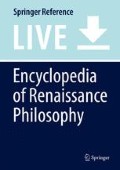Abstract
Abraham Bibago was a Jewish Averroist, whose work treats the connection between Judaism and philosophy as well as Aristotelian logic, physics, and metaphysics. His numerous writings can essentially be divided into two groups: (1) philosophical and scientific works and (2) religious works. The first group consists of interpretations of Aristotle’s works taking into account inter alia several of Averroes’ commentaries. He also addressed current scholastic issues and in general strove to promote the Aristotelian approach. His religious writings, most prominently the Derekh Emunah (“Way of Faith”), strive to present a unified portrait of the world, which preserves a place for science and philosophy alongside Talmudic based religious life. In general, Bibago says in these works that philosophy and science can lead to human perfection, but so can faith. Often, he suggests that the perfection obtained through faith is superior to that attained through human intellect. These views, however, are not supported by the philosophical and scientific works, where Bibago presents Aristotelian philosophy as the only way to achieve human perfection. He even suggests in these works that the true purpose of Judaism is to allow the elite to study philosophy. Bibago’s two contradictory views, which he gives in different kinds of works, mark him firmly as a Jewish Averroist.
References
Primary Literature
Abraham Bibago. 1521. The way of faith (Derekh Emunah). Constantinople.
1522. This will comfort us (Zeh yenaḥamenu). Salonica.
Halper, Yehuda. 2014. Commentary on Aristotle’s Metaphysics [Introduction], trans. Bibago’s introduction to his commentary on Aristotle’s Metaphysics. Zutot: Perspectives on Jewish Culture 10: 1–15.
Nuriel, Abraham, ed. 2000a. The tree of life (‘eṣ ḥayyim) [Hebrew, selections]. In Concealed and revealed in medieval Jewish philosophy, 184–185. Jerusalem: Magnes Press.
Nuriel, Abraham, ed. 2000b. Letters to Moses Arondi [Hebrew, selections]. In Concealed and revealed in medieval Jewish philosophy, 186–188. Jerusalem: Magnes Press.
Nuriel, Abraham, ed. 2000c. Commentary on Aristotle’s Posterior analytics [Hebrew, selections]. In Concealed and revealed in medieval Jewish philosophy, 188–190. Jerusalem: Magnes Press.
Nuriel, Abraham, ed. 2000d. Philosophical discussions [Hebrew, selections]. In Concealed and revealed in medieval Jewish philosophy, 191–192. Jerusalem: Magnes Press.
Zonta, Mauro. 2006. Treatise on the plurality of forms [English Paraphrase]. In Hebrew scholasticism in the fifteenth century: A history and sourcebook, 41–107. Dordrecht: Springer Press.
Secondary Literature
Ackerman, A. 2003. Jewish philosophy and the Jewish-Christian philosophical dialogue in fifteenth century Spain. In Cambridge companion to medieval Jewish philosophy, 371–390. Cambridge:Cambridge University Press.
Halper, Y. 2014. Philosophical Allegory in Bibago: Exegetical duplicity for the sake of open inquiry. Jewish Studies Quarterly. 21(3):261–276.
Kellner, M. 1986. Dogma in medieval Jewish thought: From Maimonides to Abravanel. Oxford.
Lazaroff, A. 1981. The theology of Abraham Bibago. University: University of Alabama Press.
Nuriel, A. 2000. Concealed and revealed in medieval Jewish philosophy, 181–312. Magnes Press. Jerusalem.
Sirat, C. 1985. A history of Jewish philosophy in the Middle Ages, 384–389. Cambridge:Cambridge University Press.
Steinschneider, M. 1883. Abraham Bibago’s Schriften. Monatsschrift für Geschichte und Wissenschaft des Judethums Kommissionsverlag des Bibliographischer Bureas. 32:79–96 and 125–144.
Steinschneider, M. 1893. Die hebräischen Übersetzungen des Mittelalters, 168–171. Berlin: Kommissionsverlag des Bibliographischer Bureas.
Tertiary Literature
Jospe, R. 2007. Bibago, Abraham ben Shem Tov. In Encyclopaedia Judaica, ed. M. Berenbaum and F. Skolnik, 3.570–571. Detroit:Macmillan Reference USA.
Author information
Authors and Affiliations
Corresponding author
Editor information
Editors and Affiliations
Rights and permissions
Copyright information
© 2015 Springer International Publishing Switzerland
About this entry
Cite this entry
Halper, Y. (2015). Abraham ben Shem Tov Bibago. In: Sgarbi, M. (eds) Encyclopedia of Renaissance Philosophy. Springer, Cham. https://doi.org/10.1007/978-3-319-02848-4_3-1
Download citation
DOI: https://doi.org/10.1007/978-3-319-02848-4_3-1
Received:
Accepted:
Published:
Publisher Name: Springer, Cham
Online ISBN: 978-3-319-02848-4
eBook Packages: Springer Reference Religion and PhilosophyReference Module Humanities and Social SciencesReference Module Humanities

